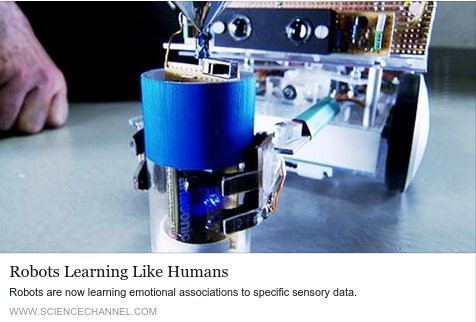All Dressed Up But No Place To Go
Thanks to Alexander R. for linking to this video at the Science Channel, which alleges that the robot in this example is well on its way to learning emotional associations. I have some very serious reservations about the video (does pushing on the robot from behind or stroking the robot really give it any indication of pleasure or pain?) but there is a much more important point to make from it:
The video highlights that the core decision-making criteria of life is pleasure and pain. The inventor can easily give the robot “senses” that recognize blue or green by sight, and no doubt it could just as easily be given systems that allow it to process sound and touch and smell and even taste. And all of us old enough to understand what a calculator is can see that it is very easy to give a robot raw computational power that far exceeds any human’s ability to process numbers.
But in the end, every robot is just a fancy calculator unless it possesses a sense of pleasure and pain, and it is very interesting to observe how the inventor in the video thinks he can reproduce that faculty. The inventor simply **instructs** the robot that green is “bad” and blue is “good.”
This is no different from any other calculation programmed in to any other machine. The great limitation is that the robot does not have the ability of any living thing to consciously experience a certain stimulation as pleasurable or painful. And even more, the robot does not have the ability, which operates in Epicurean terms through the natural faculty of anticipations and the faculty of pain and pleasure, to evaluate *new* experiences – situations that have never been confronted before in the robot’s experience – as either painful or pleasurable.
There are a couple of take-home points here. The first is that Epicurus was right in focusing on pleasure as the guide of life, and pain as the experience to be avoided.
But even more importantly, Epicurus’ insight was that pleasure and pain are primary faculties given to us by Nature as the alpha and omega of life. These faculties cannot be replaced, and they cannot be superseded, by “logic.” In the video, the inventor is essentially creating a logical association between blue and “good” – in exactly the same way that every Platonist or Stoic philosopher dreams of doing. Such philosophers employ terms like “virtue” as their tool for defining “good.” They tell us that “courage” is “good” and that their assertion should end the discussion. Anti-Pleasure philosophers don’t talk in terms of electrical circuits, but the dead end is the same. Unless there is pleasure or pain in living experience as the result of the activity, what the inventor is left with is at best an advanced calculator. And calculators, no matter how advanced, can never attain the real feelings of pleasure and pain that the youngest kitten or puppy or human infant can experience.
And when a philosophic Stoic or Platonist attempts to read pleasure and pain out of human experience, what they are left with is is nothing more than a sterile robot. No matter how much the true followers of anti-pleasure philosophers may think that they are creating students who are sophisticated and god-like in appearance, in the end their students are like blowup dolls – all dressed up but with no place to go.
The alternative set out for us by Nature, which Epicurus recognized, is the key to successful living. Though most of the world finds it too hot to handle, the truth is very simple:
We must exercise ourselves in the things which bring happiness, since, if that be present, we have everything, and, if that be absent, all our actions are directed towards attaining it. …. Wherefore we call pleasure the alpha and omega of a blessed life. Pleasure is our first and kindred good. It is the starting-point of every choice and of every aversion, and to it we come back, inasmuch as we make feeling the rule by which to judge of every good thing. [Epicurus’ Letter to Menoeceus]

